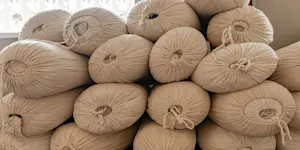What Makes This Word Tick
Ah, "dominion" – a word that immediately gives off an air of authority and control. It speaks to the power one has over a territory or group, often evoking images of kings and queens maintaining order over their realms. But don’t let it fool you; "dominion" isn't just about high castles and expansive empires. It also refers to influence or mastery over a particular sphere, even if it’s just your beloved backyard garden.
If Dominion Were a Person…
If "dominion" were a person, they’d stride confidently into a room, exuding a no-nonsense aura. They'd be the type of person who commands respect without uttering a single word, much like a wise old matriarch who holds the family together with sheer presence. They wouldn't meddle too much in the day-to-day drama, though; their interest lies in the grand scheme of things.
How This Word Has Changed Over Time
"Dominion" has maintained much of its authoritative connotation throughout history, though its scope has broadened. Originally more tied to feudal and colonial contexts, where physical lands were concerned, it has grown to include intangible forms of control, such as influence in various industries or mastery of a craft. Today, your dominion might be the kitchen during Thanksgiving or the quiet power of your book club leadership.
Old Sayings and Proverbs That Use Dominion
While sayings using "dominion" haven’t flooded the pages of wisdom books, the concept is embedded in phrases like "a man's home is his castle," emphasizing one’s dominion over their personal space. It's the age-old notion that regardless of external influences, everyone has a sphere where their word is law.
Surprising Facts About Dominion
Did you know the use of "dominion" once had a constitutional flare? Canada, for example, was known as the "Dominion of Canada" in its early days, a title that signified its status within the British Empire while signaling autonomy. Though rarely used today, it reflects how dominion can thread through national identities, all while rebranding itself over time.
Out and About With This Word
Take "dominion" with you to your next garden club meeting; as you prune your prize-winning roses, you might joke about maintaining dominion over the floral kingdom. Or slip it into conversation while discussing the influence of a certain director who has dominion over the silver screen. It brings a regal spin to otherwise banal chit-chat!
Pop Culture Moments Where Dominion Was Used
In the world of sci-fi and fantasy, "dominion" often pops up to describe vast empires or mystical territories. Picture "Game of Thrones" where dominion over the Seven Kingdoms fuels epic tales of power. It's also made appearances in films, from familial dominions in sagas like "The Godfather" to its more literal use in franchises such as "Jurassic World: Dominion," where dinosaurs and humans vie for control.
The Word in Literature
"Dominion" finds a cozy home in the realms of fantasy and historical novels, where kingdoms rise and fall based on the command and rule of powerful figures. Think of books like J.R.R. Tolkien's "The Lord of the Rings" – while 'dominion' might not appear directly, the theme of control over Middle Earth resonates deeply throughout the tale.
Moments in History with Dominion
Imagine Julius Caesar standing on the Rubicon's edge; though he didn't say "dominion," crossing declared his dominion over Rome. Fast forward to the American Revolution, where breaking free from Britain's dominion was a defining moment. Throughout history, shifts in dominion have shaped the world, whether through battles, discovery, or diplomacy.
This Word Around the World
In Australia, there's an interesting connection where "The Dominion" was considered as a potential name for the nation in 1901! Meanwhile, in geopolitical terms, territories like New Zealand were also labeled as dominions within the British Empire, highlighting its significance beyond just linguistic borders.
Where Does It Come From?
Tracing back to Latin, "dominion" arose from "dominium," meaning ownership or property. It traversed through Anglo-French before landing in Middle English, where its usage continues to echo power and control. From legal contexts to casual conversations, its roots remind us of foundations in authority.
How People Misuse This Word
Sometimes folks confuse "dominion" with dominance, assuming they're interchangeable. "Dominion" primarily refers to sovereignty or governance, while "dominance" leans more towards superiority or preeminence, often lacking the implied territory aspect of "dominion."
Words It’s Often Confused With
Dominance: While similar, dominion is about power over a specific area or realm, whereas dominance refers more to prevalence or influence.
Domain: Often interchanged with dominion, domain focuses on territory or field of action but lacks the authoritative aspect.
Authority: Though related, authority often implies official power or sanctioned control, not necessarily bounded by territory.
Additional Synonyms and Antonyms
For those looking to spice up vocabulary, synonyms for "dominion" include sovereignty, reign, and jurisdiction. Its antonyms, reflecting lack of control, include subjugation and submission.
Want to Try It Out in a Sentence?
Ready to test the waters? Here's a starter: "After taking up painting, Karen found her dominion in the art studio, where colors danced to her command." See how effortlessly it brings a touch of gravitas to her creative control? Give it a whirl in your conversations!
















